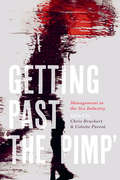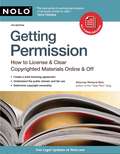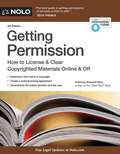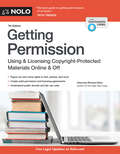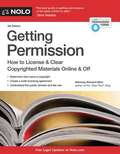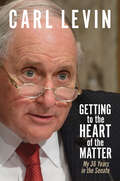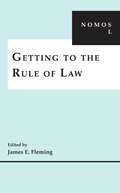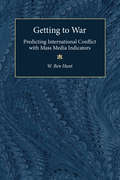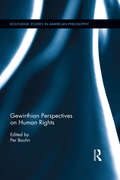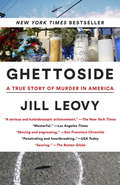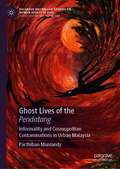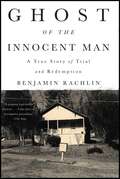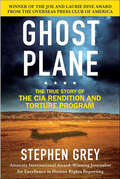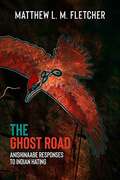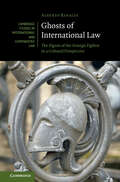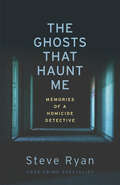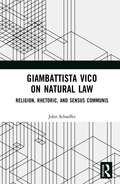- Table View
- List View
Getting Past "the Pimp": Management in the Sex Industry
by Chris Bruckert Colette ParentThe issue of third parties in the sex industry – individuals who are neither the client nor the service provider – has become especially urgent in our current socio-political context. Surprisingly, in spite of an emergence of critical scholarship on the sex industry, as well as recommendations by key governmental committees, little attention has been extended to examining the role of individuals labelled pimps, procurers, and traffickers. Addressing the function of third parties on the street and indoors, Getting Past "the Pimp" incorporates solid empirical evidence including documentary analysis, 75 interviews with third parties, and 52 interviews with sex workers to unpack the roles and relationships of third parties in three sectors of the sex industry‒ incall/outcall, stripping, and street-based prostitution. Contrary to prevailing stereotypes that portray third parties as inherently abusive and controlling, these workers fulfill important roles and provide vital services as associates, fee-for-service hires, and agency owners or managers responsible for scheduling and arranging transportation and security. The sex industry, like mainstream businesses, rarely depend exclusively on client and worker to operate efficiently, and safely.
Getting Permission
by Richard Stim AttorneyUsing copyrighted materials? Get permission and stay legal If you plan to use any copyrighted material for your own purposes, you need to get permission first from the owners of that work. If you don't, you could find yourself slapped with an expensive and time-consuming lawsuit. Getting Permission tackles the permissions process head-on -- without the legalese. It shines the light on whom to ask for permission, as well as when -- and how much to expect -- to pay for permission. Comprehensive and easy-to-read, the book covers: the permissions process the public domain copyright research fair use academic permissions the elements of a license and merchandise agreement the use of a trademark or fictional character and much more Getting Permission includes agreements for acquiring authorization to use text, photographs, artwork, and music, whether it's found online or off. The 4th edition of this essential guide is completely updated to reflect the latest laws and court decisions. Plus, read an all-new collection of practical, real-life FAQs, based on author Richard Stim's popular intellectual property blog, Dear Rich: Nolo's Patent, Copyright & Trademark Blog. The CD-ROM that accompanies the printed version of this book includes forms or other tools; in this eBook, you'll find all those documents in the appendix or at the back of the book.
Getting Permission: How to License & Clear Copyrighted Materials Online & Off
by Richard StimIf you're using copyrighted material, don't get sued--get permission! Online or off, before you use some or all of a song, photo, book, or any other work covered by copyright law, you need to get permission first. If you don't, you could end up facing legal action from the rights-holder. This easy-to-use book shows you how to get the rights you need, with step-by-step instructions and more than 30 forms. Find out when permission is required, who to ask, and when (and how much) you can expect to pay. Getting Permission explains: the copyright permission process the public domain ("free" content) how to figure out who owns a copyright website permissions the "fair use" rule school-related permissions license and merchandise agreements (including sample contracts and other forms) and much more. The 6th edition is updated with summaries of recent copyright and fair use cases, as well as dozens of real-life questions from the Dear Rich permissions blog. Downloadable forms available at nolo.com
Getting Permission: How to License & Clear Copyrighted Materials Online & Off
by Richard StimIf you’re using copyrighted material, don’t get sued—get permission! Online or off, before you use some or all of a song, photo, book, or any other work covered by copyright law, you need to get permission first. If you don’t, you could end up facing legal action from the rights-holder. This easy-to-use book shows you how to get the rights you need, with step-by-step instructions and more than 30 forms. Find out when permission is required, who to ask, and when (and how much) you can expect to pay. Getting Permission explains: the copyright permission process the public domain (“free” content) how to figure out who owns a copyright website permissions the “fair use” rule school-related permissions license and merchandise agreements (including sample contracts and other forms) and much more. This edition is updated with summaries of recent copyright and fair use cases, as well as dozens of real-life questions from the Dear Rich permissions blog. All forms are downloadable through a special link in the book.
Getting Permission
by Richard StimUsing copyrighted materials? Get permission and stay legal If you plan to use any copyrighted material for your own purposes, you need to get permission first from the owners of that work. If you don't, you could find yourself slapped with an expensive and time consuming lawsuit. Getting Permission tackles the permissions process head on without the legalese. It shines the light on whom to ask for permission, as well as when and how much to expect to pay for permission. Comprehensive and easy to read, the book covers: - the permissions process - the public domain - copyright research - fair use - academic permissions - the elements of a license and merchandise agreement - the use of a trademark or fictional character - and much more Getting Permission includes agreements for acquiring authorization to use text, photographs, artwork, and music, whether it's found online or off. The edition of this essential guide is completely updated to reflect the latest laws and court decisions. Plus, read an all new collection of practical, real life FAQs, based on author Richard Stim's popular intellectual property blog, Dear Rich: Nolo's Patent, Copyright & Trademark Blog. With Downloadable Forms
Getting To Maybe: How To Excel On Law School Exams
by Richard Michael Fischl Jeremy PaulETHS graduate in 1970, Fischel has had a successful and quite varied career in law. Here he presents a clear and engaging study-aid designed to get prospective lawyers to quit regurgitating course outlines and to think in terms of legal analysis.
Getting to Scale: Growing Your Business Without Selling Out
by Jill BamburgRenowned academic and businesswoman Jill Bamburg shows how mission-driven entrepreneurs can preserve the values of their company while maintaining their growth and competitiveness in the marketplace.
Getting to the Heart of the Matter: My 36 Years in the Senate
by Carl LevinFormer senator Carl Levin’s memoir demonstrates the value of pragmatism, empathy, and compromise. Representing Michigan for thirty-six years in the U.S. Senate, Carl Levin, the longest-serving senator in Michigan history, was known for his dogged pursuit of the truth, his commitment to holding government accountable, and his basic decency. Getting to the Heart of the Matter: My 36 Years in the Senateis his story – from his early days in Detroit as the son of a respected lawyer to the capstone of his career as chair of both the Senate Armed Services Committee and the Senate Permanent Subcommittee on Investigations. Levin's career placed him at the center of some of our nation's most critical points in modern times: from the aftermath of the 1967 Detroit riots, to the Clinton impeachment, through 9/11 and the wars in Iraq and Afghanistan, and the 2008 financial crisis. He met with numerous world leaders, including Egypt's Anwar Sadat and China's Jiang Zemin. Getting to the Heart of the Matterrecounts Levin's experiences, thoughts, and actions during these historic moments.Consisting of seventeen chapters, the book takes the reader through Levin's early life in Detroit of the 1940s, 50s, and 60s where he met his wife, started a family, practiced law and served as the first General Counsel for the newly created Michigan Civil Rights Commission and the chief appellate defender for Detroit's Legal Aid Office. Elected to the Detroit City Council in 1969, where Levin served for eight years including four as Council president, the book describes how his fight against the Department of Housing and Urban Development's devastating housing practices in the neighborhoods of Detroit led him to run for the U.S. Senate with a pledge to make government work more effectively. Winning election six times, Levin had an illustrious career in the Senate where he challenged leaders in government and the private sector for the greater good of the nation. Levin describes how, as a Democrat, throughout his time in the Senate, he worked with Republican senators who often held different policy positions in order to find common ground to achieve national goals, and how he and his Senate staff searched for creative solutions to trade issues, support for the auto industry and manufacturing sector, U.S. military action in Iraq and Afghanistan, and efforts to protect the Great Lakes and the environment, among many other issues.Levin's hope in writing this memoir is that by sharing his deeply held beliefs about the responsibility of elected officials, the book will serve as a resource for people beginning a career in, or contemplating running for, public office. Readers with an interest in politics, history, facts, and perseverance will find kinship in this book.
Getting to the Rule of Law: NOMOS L (NOMOS - American Society for Political and Legal Philosophy #31)
by James E. FlemingThe rule of law has been celebrated as “an unqualified human good," yet there is considerable disagreement about what the ideal of the rule of law requires. When people clamor for the preservation or extension of the rule of law, are they advocating a substantive conception of the rule of law respecting private property and promoting liberty, a formal conception emphasizing an “inner morality of law,” or a procedural conception stressing the right to be heard by an impartial tribunal and to make arguments about what the law is? When are exertions of executive power “outside the law” justified on the ground that they may be necessary to maintain or restore the conditions for the rule of law in emergency circumstances, such as defending against terrorist attacks? In Getting to the Rule of Law a group of contributors from a variety of disciplines address many of the theoretical legal, political, and moral issues raised by such questions and examine practical applications “on the ground” in the United States and around the world. This timely, interdisciplinary volume examines the ideal of the rule of law, questions when, if ever, executive power “outside the law” is justified to maintain or restore the rule of law, and explores the prospects for and perils of building the rule of law after military interventions.
Getting to War: Predicting International Conflict with Mass Media Indicators
by W. Ben HuntThis book shows how to predict wars. More specifically, it tells us how to anticipate in a timely fashion the scope and extent of interstate conflict. By focusing on how all governments--democratic or not--seek to secure public support before undertaking risky moves such as starting a war, Getting to War provides a methodology for identifying a regime's intention to launch a conflict well in advance of the actual initiation. The goal here is the identification of leading indicators of war. Getting to War develops such a leading political indicator by a systematic examination of the ways in which governments influence domestic and international information flows. Regardless of the relative openness of the media system in question, we can accurately gauge the underlying intentions of those governments by a systematic analysis of opinion-leading articles in the mass media. This analysis allows us to predict both the likelihood of conflict and what form of conflict--military or diplomatic/economic--will occur.
Gewalt unter der Geburt: Standard - Haftung - Sanktion? (MedR Schriftenreihe Medizinrecht)
by Marie von HirschheydtDieses Buch schließt eine Lücke auf dem Gebiet der rechtlichen Auseinandersetzung im Bereich der Geburtshilfe und Geburtsmedizin. Hierbei eignet es sich als zivilrechtliches Nachschlagewerk des geburtshelferischen Wissens sowohl für Rechtsanwender als auch für alle an einer Geburt beteiligten Personen und betritt hierbei Neuland in Bezug auf die rechtliche Beurteilung von geburtshelferischen Interventionen. Unter Berücksichtigung der zivilrechtlichen, strafrechtlichen und rechtshistorischen Aspekte verdeutlicht dieses Werk die Notwendigkeit der intensiven und offenen Auseinandersetzung zwischen Recht und Medizin. Neben den juristisch möglichen Konsequenzen zeigt die Arbeit auch Lösungsansätze auf, wie die Geburtssituation für alle Beteiligten positiver wahrgenommen werden kann und eine Aufarbeitung mit schwierigen Geburten und somit Verbesserung der derzeitigen Situation in der Geburtshilfe bzw. Geburtsmedizin gelingen kann.
Gewaltfreiheit zwischen Anspruch und Realität: Grundsatzfragen • Band 6 (Gerechter Frieden)
by Angelika Dörfler-Dierken Hendrik StoppelDas Bekenntnis zum Weg der Gewaltfreiheit nimmt in der Kundgebung der EKD-Synode 2019 „Kirche auf dem Weg der Gerechtigkeit und des Friedens“ den ersten Rang unter den Aussagen zum Thema Frieden ein. Aber der kirchliche Diskurs kennt auch eine zweite Option, die unter bestimmten Bedingungen notwendig werden kann: den Gebrauch von „rechtserhaltender Gewalt“, der gerade den Frieden herstellen oder wahren soll. In diesem Spannungsfeld stehen die kirchliche Militärseelsorge und Soldat*innen mit kirchlicher Bindung. Die verschiedenen Voten und deren Grundlegungen und Konsequenzen werden in diesem Band diskutiert.
Gewirthian Perspectives on Human Rights (Routledge Studies in American Philosophy)
by Per BauhnGewirth’s theory of human rights has made a major contribution to philosophy. In this edited collection, contributors from a broad range of disciplines discuss the theoretical and practical application of Gewirthian theory to current world issues. Case studies highlight mental health, the LGBT community, intellectual disabilities, global economic inequality, and market instability to provide a truly interdisciplinary study. This important contribution to human rights scholarship provides a platform for further discussion of Gewirthian theory. It will be of interest to those researching moral, legal, and political philosophy, as well as policy makers, social workers, and medical staff.
Ghettoside: A True Story of Murder in America
by Jill LeovyA masterly work of literary journalism about a senseless murder, a relentless detective, and the great plague of homicide in America. On a warm spring evening in South Los Angeles, a young man is shot and killed on a sidewalk minutes away from his home, one of the thousands of black Americans murdered that year. His assailant runs down the street, jumps into an SUV, and vanishes, hoping to join the scores of killers in American cities who are never arrested for their crimes. But as soon as the case is assigned to Detective John Skaggs, the odds shift. Here is the kaleidoscopic story of the quintessential, but mostly ignored, American murder—a “ghettoside” killing, one young black man slaying another—and a brilliant and driven cadre of detectives whose creed is to pursue justice for forgotten victims at all costs. Ghettoside is a fast-paced narrative of a devastating crime, an intimate portrait of detectives and a community bonded in tragedy, and a surprising new lens into the great subject of why murder happens in our cities—and how the epidemic of killings might yet be stopped.
Ghost: My Thirty Years as an FBI Undercover Agent
by Ralph Pezzullo Michael R. McGowanThe explosive memoir of an FBI field operative who has worked more undercover cases than anyone in history.Within FBI field operative circles, groups of people known as “Special” by their titles alone, Michael R. McGowan is an outlier. 10% of FBI Special Agents are trained and certified to work undercover. A quarter of those agents have worked more than one undercover assignment in their careers. And of those, less than 10% of them have been involved in more than five undercover cases. Over the course of his career, McGowan has worked more than 50 undercover cases. In this extraordinary and unprecedented book, McGowan will take readers through some of his biggest cases, from international drug busts, to the Russian and Italian mobs, to biker gangs and contract killers, to corrupt unions and SWAT work. Ghost is an unparalleled view into how the FBI, through the courage of its undercover Special Agents, nails the bad guys. McGowan infiltrates groups at home and abroad, assembles teams to create the myths he lives, concocts fake businesses, coordinates the busts, and helps carry out the arrests. Along the way, we meet his partners and colleagues at the FBI, who pull together for everything from bank jobs to the Boston Marathon bombing case, mafia dons, and, perhaps most significantly, El Chapo himself and his Sinaloa Cartel.Ghost is the ultimate insider's account of one of the most iconic institutions of American government, and a testament to the incredible work of the FBI.
Ghost Lives of the Pendatang: Informality and Cosmopolitan Contaminations in Urban Malaysia (Palgrave Macmillan Studies on Human Rights in Asia)
by Parthiban MuniandyThis book is an ethnographic study of migrants, refugees and ‘temporary’ people in Malaysia, incorporating narratives, personal stories, and observations of everyday life in Kuala Lumpur and Georgetown, Penang. Rather than focusing on specific migrant communities or refugee ‘camps’, the book takes subaltern cosmopolitanism as its central lens to look at how different and diverse communities of non-citizen ‘pendatang’ (aliens) co-habit, work and live together in Malaysia. Urban centers in Malaysia offer the space for informality that allow stateless and undocumented people to seek out opportunities, while also finding ways to assimilate or even ‘disappear’ into the fabric of society. The book focuses on the notion of ‘contaminations’, rather than migration or migrants, to underscore one of the most important findings of the ethnographic study – that migrant life in Malaysia is critically integral, embedded and interwoven into the everyday life in the city - shaping and affecting all aspects of daily life from production and supply chains, food service networks, cultural and religious practices, waste and recycling work, to more intimate and private contexts such as romantic relationships, family life and sex-work. Hybridity, inter-mixing and bastardization are part and parcel of everyday urbanism in KL and Penang – these ‘contaminating elements’ challenge and disrupt categories of the ‘national’ and categories such as insider/outsider, national purity, and politically constructed divisions between ethnic and racial groups. The book thus relies upon detailed ethnographic narratives curated over a decade of study, offering students interested in fieldwork research insights into the types of engagements and commitments necessary for helping build the complex, uneasy and destabilizing knowledge that characterizes critical ethnography.
Ghost of the Innocent Man: A True Story of Trial and Redemption
by Benjamin RachlinDuring the last two decades, more than two thousand American citizens have been wrongfully convicted. Ghost of the Innocent Man brings us one of the most dramatic of those cases and provides the clearest picture yet of the national scourge of wrongful conviction and of the opportunity for meaningful reform.When the final gavel clapped in a rural southern courtroom in the summer of 1988, Willie J. Grimes, a gentle spirit with no record of violence, was shocked and devastated to be convicted of first-degree rape and sentenced to life imprisonment. Here is the story of this everyman and his extraordinary quarter-century-long journey to freedom, told in breathtaking and sympathetic detail, from the botched evidence and suspect testimony that led to his incarceration to the tireless efforts to prove his innocence and the identity of the true perpetrator. These were spearheaded by his relentless champion, Christine Mumma, a cofounder of North Carolina's Innocence Inquiry Commission. That commission-unprecedented at its inception in 2006-remains a model organization unlike any other in the country, and one now responsible for a growing number of exonerations.With meticulous, prismatic research and pulse-quickening prose, Benjamin Rachlin presents one man's tragedy and triumph. The jarring and unsettling truth is that the story of Willie J. Grimes, for all its outrage, dignity, and grace, is not a unique travesty. But through the harrowing and suspenseful account of one life, told from the inside, we experience the full horror of wrongful conviction on a national scale. Ghost of the Innocent Man is both rare and essential, a masterwork of empathy. The book offers a profound reckoning not only with the shortcomings of our criminal justice system but also with its possibilities for redemption.
Ghost Plane: The True Story of the CIA Rendition and Torture Program
by Stephen GreyFor the first time, Stephen Grey tells the inside story of international prisons sanctioned by the U.S. Government and used by the CIA to hold and torture people suspected of terrorism. Using contacts deep inside the U.S. Government, Grey reveals how deeply the Bush administration is involved in the program and questions the truth of statements made by Secretary of State Condoleeza Rice. He also shines a spotlight on the heads of European nations who turned a blind eye to the program when it showed up in their back yards. Grey takes an unflinching look at a horrendous practice that scorns Geneva Convention rules and is powered by corruption at the highest levels of governments worldwide. Through his unprecedented access to CIA flight records and dozens of sources at the senior levels of the current administration, Grey has produced a story of flight plans, extreme torture, and the clash of religions and governmental posturing that goes on today. Ghost Plane tells the stories of individuals abducted at airports around the world and transported for interrogation and torture on a fleet of leased planes manned by CIA operatives. Grey paints a disburing ethical picture of the war on terror and lays the responsibility for abduction and torutre at the doorstep of Washington, D.C.
Ghost Road: Anishinaabe Responses to Indian Hating
by Matthew L. M. FletcherEven before the Revolutionary War, American colonists feared and fought “merciless Indian savages,” and through the following centuries, American law and policy have been molded by the relentless tradition of Indian-hating. From proportional representation and restrictions on the right to bear arms, to the break-up of tribal property rights and the destruction of Indian culture and family, the attacks on tribal governance and people continue and remain endemic. More than just a study of the progression of law, this book balances each chapter’s history with the relating of a traditional Anishinaabe story or teaching, providing both context and a roadmap for survival.
Ghosts of International Law: The Figure of the Foreign Fighter in a Cultural Perspective (Cambridge Studies in International and Comparative Law)
by Alberto RinaldiHeroes and villains, idealists and mercenaries, freedom fighters and religious fanatics. Foreign fighters tend to defy easy classification. Good and bad images of the foreign combatant epitomize different conceptions of freedom and are used to characterize the rightness or wrongness of this actor in civil wars. The book traces the history of these figures and their afterlife. It does so through an interdisciplinary methodology employing law, history, and psychoanalytical theory, showing how different images of the foreign combatant are utilized to proscribe or endorse foreign fighters in different historical moments. By linking the Spanish, Angolan, and Syrian civil wars, the book demonstrates how these figures function as a precedent for later periods and how their heritage keeps haunting the imaginary of legal actors in the present.
The Ghosts That Haunt Me: Memories of a Homicide Detective
by Steve RyanAfter years working in homicide, retired Toronto detective Steve Ryan reflects on six cases he will never forget.Retired detective Steve Ryan worked in Toronto’s homicide squad for over a decade. For Ryan, the stories of Toronto’s most infamous crimes were more than just a headline read over morning coffee — they were his everyday life. After investigating over one hundred homicides, Ryan can never forget the tragedies and the victims, even after his retirement from the police force. In The Ghosts That Haunt Me, he reflects on six of the many cases that greatly impacted him — seven people whose lives were senselessly taken — and that he still thinks about nearly every day. While the stories are hard to tell for Ryan, they were harder to live through. Yet somewhere between the crimes and the heartache is a glimmer of hope that good eventually does prevail and that healing can come after grief.
The Ghostwriters: Lawyers and the Politics behind the Judicial Construction of Europe (Cambridge Studies in Law and Society)
by Tommaso PavoneThe European Union is often depicted as a cradle of judicial activism and a polity built by courts. Tommaso Pavone shows how this judge-centric narrative conceals a crucial arena for political action. Beneath the radar, Europe's political development unfolded as a struggle between judges who resisted European law and lawyers who pushed them to embrace change. Under the sheepskin of rights-conscious litigants and activist courts, these “Euro-lawyers” sought clients willing to break state laws conflicting with European law, lobbied national judges to uphold European rules, and propelled them to submit noncompliance cases to the European Union's supreme court – the European Court of Justice – by ghostwriting their referrals. By shadowing lawyers who encourage deliberate law-breaking and mobilize courts against their own governments, The Ghostwriters overturns the conventional wisdom regarding the judicial construction of Europe and illuminates how the politics of lawyers can profoundly impact institutional change and transnational governance.
Giambattista Vico on Natural Law: Rhetoric, Religion and Sensus Communis
by John SchaefferThis book introduces the thought of Giambattista Vico (1668-1744) into the discussion about natural law. For many critics, natural law is not natural but a façade behind which lurks the supernatural – that is, revealed religion. While current notions of natural law are based on either Aristotelian/Thomistic principles or on Enlightenment rationalism, the book shows how Vico was the only natural law thinker to draw on the Roman legal tradition, rather than on Greek or Enlightenment philosophy. Specifically, the book addresses how Vico, drawing his inspiration from Roman history, incorporated both rhetoric and religion into a dynamic concept of natural law grounded in what he called the sensus communis: the entire repertoire of values, images, institutions, and even prejudices that a community takes for granted. Vico denied that natural law could ever furnish a definitive answer to moral problems in the social/public sphere. Rather he maintained that such problems had to be debated in the wider arena of the sensus communis. For Vico, as this book argues, natural law principles emerged from these debates; they did not resolve them.
Giant in the Shadows: The Life of Robert T. Lincoln
by Jason EmersonAlthough he was Abraham and Mary Lincoln’s oldest and last surviving son, the details of Robert T. Lincoln’s life are misunderstood by some and unknown to many others. Nearly half a century after the last biography about Abraham Lincoln’s son was published, historian and author Jason Emerson illuminates the life of this remarkable man and his achievements in Giant in the Shadows: The Life of Robert T. Lincoln. Emerson, after nearly ten years of research, draws upon previously unavailable materials to offer the first truly definitive biography of the famous lawyer, businessman, and statesman who, much more than merely the son of America’s most famous president, made his own indelible mark on one of the most progressive and dynamic eras in United States history. Born in a boardinghouse but passing his last days at ease on a lavish country estate, Robert Lincoln played many roles during his lifetime. As a president’s son, a Union soldier, an ambassador to Great Britain, and a U.S. secretary of war, Lincoln was indisputably a titan of his age. Much like his father, he became one of the nation’s most respected and influential men, building a successful law practice in the city of Chicago, serving shrewdly as president of the Pullman Car Company, and at one time even being considered as a candidate for the U.S. presidency. Along the way he bore witness to some of the most dramatic moments in America’s history, including Robert E. Lee’s surrender at Appomattox Courthouse; the advent of the railroad, telephone, electrical, and automobile industries; the circumstances surrounding the assassinations of three presidents of the United States; and the momentous presidential election of 1912. Giant in the Shadows also reveals Robert T. Lincoln’s complex relationships with his famous parents and includes previously unpublished insights into their personalities. Emerson reveals new details about Robert’s role as his father’s confidant during the brutal years of the Civil War and his reaction to his father’s murder; his prosecution of the thieves who attempted to steal his father’s body in 1876 and the extraordinary measures he took to ensure it would never happen again; as well as details about the painful decision to have his mother committed to a mental facility. In addition Emerson explores the relationship between Robert and his children, and exposes the actual story of his stewardship of the Lincoln legacy—including what he and his wife really destroyed and what was preserved. Emerson also delves into the true reason Robert is not buried in the Lincoln tomb in Springfield but instead was interred at Arlington National Cemetery. Meticulously researched, full of never-before-seen photographs and new insight into historical events, Giant in the Shadows is the missing chapter of the Lincoln family story. Emerson’s riveting work is more than simply a biography; it is a tale of American achievement in the Gilded Age and the endurance of the Lincoln legacy.
Gibt es ein Recht auf Gemeinwohl?: Öffentliche Interessen im Blickwinkel von Rechts- und Politikwissenschaft (essentials)
by Christoph StrünckPolitikwissenschaftliche Pluralismustheorien betrachten Gemeinwohl als Resultat politischer Kompromisse. Solche prozeduralen Konzepte finden sich auch in der Rechtswissenschaft, wenn es darum geht, allgemeinen und schwachen Interessengruppen besondere Klagerechte einzuräumen. Allerdings müssen Gerichte in ihren Urteilen inhaltlich begründen, inwiefern mit solchen Klagen öffentliche Interessen gewahrt werden. Am Beispiel des Verbraucherschutzes erläutert der Autor, warum moderne Pluralismuskonzepte auch solche inhaltlichen Gemeinwohlbestimmungen in die Analyse der Interessenvermittlung einbeziehen sollten.
